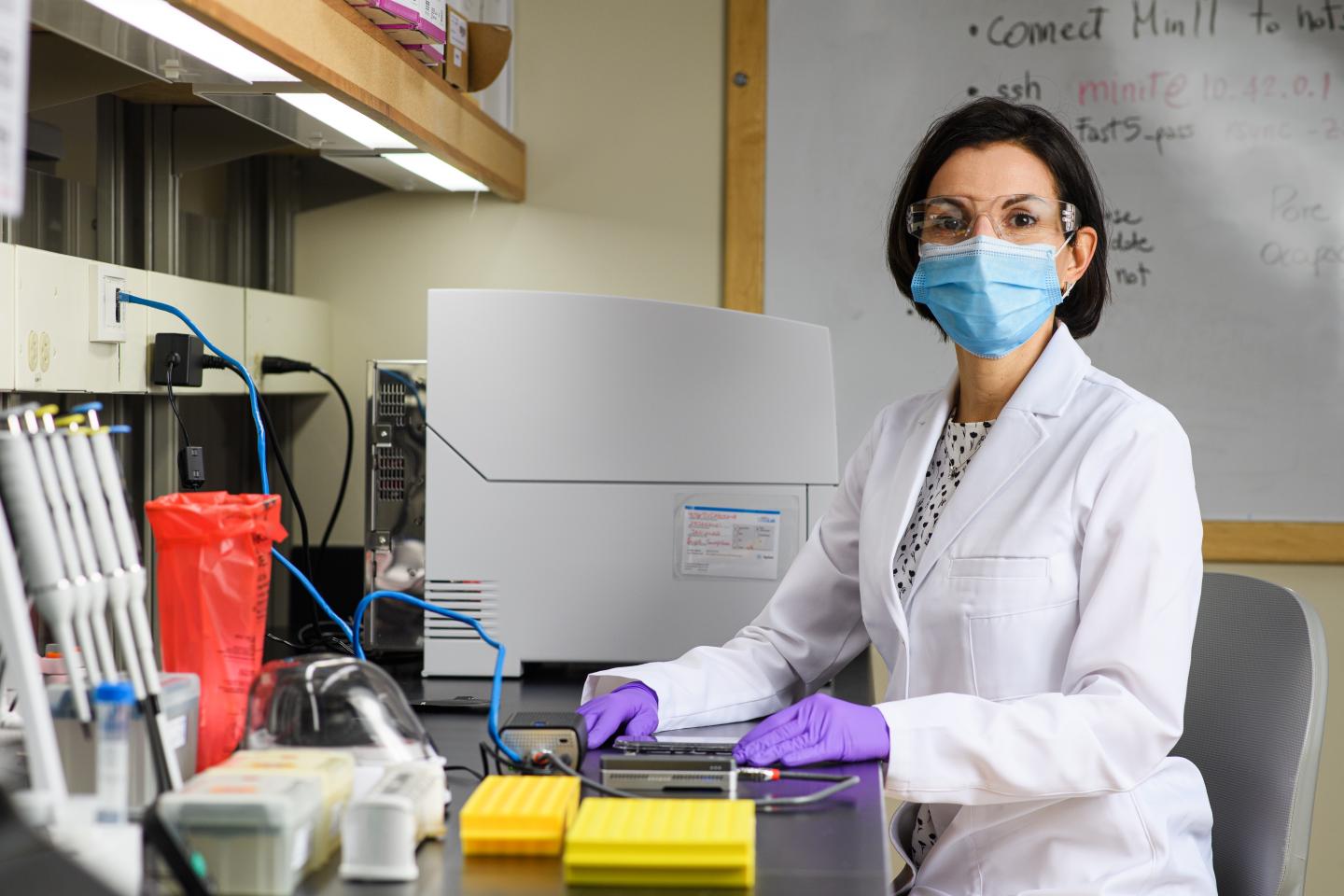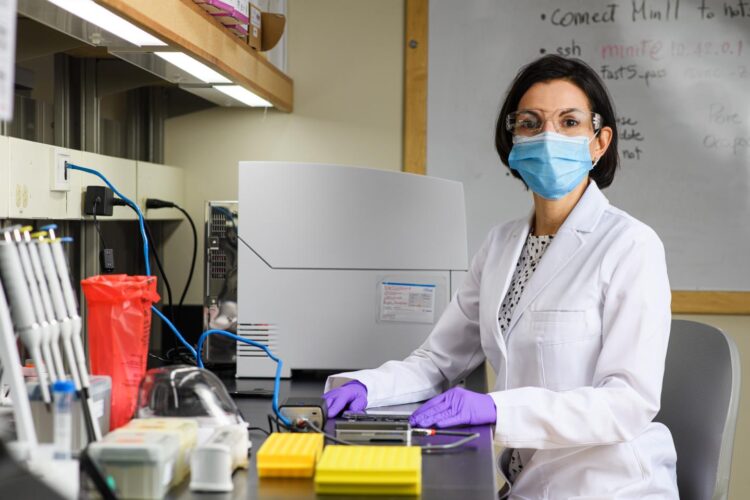
Credit: Purdue University photo/Rebecca McElhoe
WEST LAFAYETTE, Ind. — Scientists have been using genetics to track diseases for decades. Now, a team at Purdue University that typically tracks malaria spread in Southern and Central Africa is using its expertise to track COVID-19 in Indiana.
Giovanna Carpi’s lab studies the genomics of infectious diseases to better understand how they spread. An assistant professor of biological sciences, she focuses her research primarily on malaria. With the onset of the pandemic, her lab pivoted to study the genomic epidemiology of SARS-CoV-2, the novel coronavirus that causes COVID-19, including tracking variants.
Tracking variants of diseases – whether they are bacterial like tuberculosis, viral like SARS-CoV-2 or parasitic like malaria – helps scientists understand how they travel in a community, how they mutate and adapt, and how vaccines and other mitigation strategies are working.
“We study genomic epidemiology, large-scale genomic studies of communicable disease, and our lab is investing in new sequencing and informatic technologies to study the genomes of infectious diseases to understand transmission,” Carpi said. “This allows us to do sequencing in real time, to conduct genomic surveillance, which has transformed our understanding of the spread of diseases.”
Carpi and her lab are part of the Purdue Institute of Inflammation, Immunology and Infectious Disease, which works across disciplines to advance the treatment and understanding of infectious diseases, cancer and chronic inflammatory conditions. Carpi studies the way diseases spread as well as how pathogens evolve as they adapt within, and move among, infected individuals. Currently, her work focuses on malaria, especially in countries like Zambia, which is working to eliminate malaria. In situations where malaria cases are rare, it is even more important to understand how the pathogen is introduced and persists through a population, to better prevent sustained transmission. That important work has not been put on hold, but since January, the novel coronavirus has become another priority for her lab.
SARS-CoV-2 and malaria have very little in common with each other. Malaria is a protozoan, a parasite carried and transmitted by certain species of mosquitoes. SARS-CoV-2 is a virus, spread mainly by person-to-person contact and through tiny droplets of bodily fluids in the air. But though they are different diseases, both on the microscopic level and in how they are spread, the methods scientists use to study them are similar.
“They are very different systems, but you use the same technology to study them both,” Carpi said. “The sequencing procedures and the computations are very similar.”
In fact, the novel coronavirus may be easier to study than malaria because its genome is much smaller, simpler and easier to monitor. Carpi’s work on malaria, and the equipment and expertise in her lab, puts her in a prime position, along with Purdue’s Animal Disease Diagnostic Laboratory, to be able to track COVID-19 variants.
“We do this kind of tracking all the time for malaria,” Carpi said. “We switched quickly and were able to adapt to sequencing SARS-CoV-2 in December 2020 as variants of concern were introduced and started spreading in the United States. We had to scale up. We are the only lab in Indiana – along with our partners at the Animal Disease Diagnostic Laboratory – to be able to switch overnight to studying the SARS-CoV-2 genome. I have an amazing lab team, and we have been able to adapt with a very fast turnaround time.”
Tracking the genetics of a virus, or any disease, gives scientists insights into how it is moving through a community. Patients with similar variants – with viruses with similar mutations – probably got the virus from the same place or from each other. Novel variants can indicate new viruses coming into a community from elsewhere. Comparing genomics also can help scientists understand how the variant is responding to vaccinations, as well as other anti-infectious measures including masks, quarantines, social distancing, intensive cleaning and other procedures.
Since January, Carpi’s lab has sequenced and studied about 200 complete viral genomes, including variants that can be screened by testing. She is tracking the novel coronavirus in the Purdue community, working with the Protect Purdue Health Center, as well as throughout the state of Indiana. The information she gathers helps inform policymakers, ensuring that city, state and university leaders have the best and most accurate, up-to-date information possible.
“The work my lab is doing has been critical,” Carpi said. “The Indiana state health department has sent us samples because we can do the work for them faster than the CDC labs can.”
###
About the Purdue Institute of Inflammation, Immunology and Infectious Disease
The Purdue Institute of Inflammation, Immunology and Infectious Disease leverages the significant diversity of life sciences, physical sciences and engineering on campus to invent and integrate basic immunologic advances, new diagnostics, probe basic biological and inflammatory processes and to develop and commercialize novel intervention methods to control an array of chronic inflammatory conditions, cancer and infectious diseases.
About Purdue University
Purdue University is a top public research institution developing practical solutions to today’s toughest challenges. Ranked the No. 5 Most Innovative University in the United States by U.S. News & World Report, Purdue delivers world-changing research and out-of-this-world discovery. Committed to hands-on and online, real-world learning, Purdue offers a transformative education to all. Committed to affordability and accessibility, Purdue has frozen tuition and most fees at 2012-13 levels, enabling more students than ever to graduate debt-free. See how Purdue never stops in the persistent pursuit of the next giant leap at https:/
Media Contact
Brittany Steff
[email protected]
Original Source
https:/





